新概念英语第一册课文翻译及学习笔记Lesson91
(完整版)新概念第一册Lesson91-92
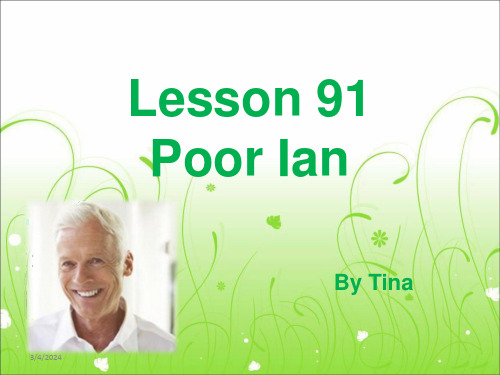
come to work→work等
• 现在完成时可表示持续到现在的动作或 状态,动词一般是延续性的,如
• live, teach, learn, work, study, know.
• 过去时常用的非持续性动词有: • come, go, leave, start, die, finish,
become, get married.
特疑词+ have (has)+主语+p.p?
(2) 表示动作发生在过去某个不确定的时间, 但对现在留下了某种影响和结果。 常被just、already、yet 等副词修饰。
-Have you had lunch yet? 你(已经)吃午饭了吗? -Yes, I have. I‘ve just had it. 我刚刚吃过。(现在我不饿了)
(强调动作,过程)
move out (of) 搬出来
move away
搬走
move from…to…
从…搬到…
②感动,打动
This story moved me. 这个故事感动了我。 The news moved him very much. 这消息使他很感动。
Байду номын сангаас
★ miss [mis] v. 想念,思念
★ person ['pə:sən] n. 人
He is a nice/good person. 他是个好人。 in person 亲自,直接的 He will go to get the money in person. 他将亲自去取钱。
★ personal adj. 个人的,私人的
['pə:sənəl]
• The patient is lying still. • 病人安静地躺着。
新概念英语第一册91-92课笔记

新概念英语第一册91-92课笔记-CAL-FENGHAI.-(YICAI)-Company One1Lesson 91 Poor Ian![课文]CATHERING: Has Ian sold his house yet?JENNY: Yes, he has. He sold it last week.CATHERING: Has he moved to his new house yet?JENNY: No, not yet. He's still here.He's going to move tomorrow.CATHERING: WhenTomorrow morning.JENNY: No. Tomorrow afternoon. I'll miss him.He has always been a good neighbour.LIDA: He's a very nice person.We'll all miss him.CATHERING: When will the new people move into this house?JENNY: I think that they'll move in the day after tomorrow.LINDA: Will you see Ian today, Jenny?JENNY: Yes, I will.LINDA: Please give him my regards.CATHERING: Poor Ian!He didn't want to leave this house.JENNY: No, he didn't want to leave, but his wife didstill [stil] ad.还,仍旧move [mu:v] v.搬家miss [mis] v.想念,思念neighbour ['neibə] n.邻居person ['pə:sn] n.人people ['pi:pl] n.人们poor [puə] a.可怜的★still adv. 还,仍旧① adv. 还是,仍然I still can’t decide where to go. 我还是不能决定去哪儿。
新概念一册Lesson91 Poor Ian

Grammar
一般将来时
I am going to see a play. She is going to go fishing. He is going to play football.
Move from…to…从…搬到… They moved from Nanjing to Shenzhen. 我们从乡村搬到城市。 We moved from country to city. 我们从南充搬到成都。 We moved from south to Chengdu.
来看这一组句子
He didn’t want to leave this house. No, he didn’t want to leave, but his wife did. 第二个句子是对第一个句子的证实,这里不可以 按照中文习惯去赞同别人的说法,而是要根据 事实来说,因此回答no, he didn’t want to leave. 但是翻译成中文的时候要说,是的,他 不愿意离开。 例句: He didn’t go to school last week, did he? No, he didn’t. 是的,他没去。 Yes, he did. 不,他去了的。
He has always been a good neighbour. 现在完成时 指Ian自从在这住开始到现在一直都很好 He’s a very nice person. 表达人的人品很好可以用good或nice。 person 强调的个体的人,可以有复数形 式persons people 通常是人的统称“人们,人民”, 本身是复数形式,没有单数形式
Listen and answer
Ian’s want wife.to sell the Who house?
新概念一 lesson91-92 (完整版)
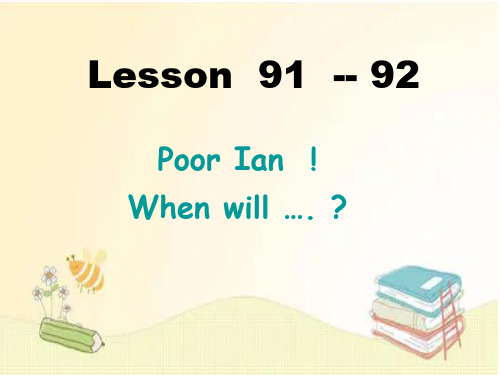
New words and expressions
• poor [ puE ]
adj.
3)笨拙的,差劲的
poor jokes 差劲的笑话
a poor excuse 笨拙的借口
New words and expressions
• poor [ puE ]
adj.
3)笨拙的,差劲的 sth
be poor at 不擅长….. doing sth eg: My daughter is poor at swimming.
( D)7.Mr smith _______________to Tokyo and he will be back in
a week • A. has been B. has visited C. has sent D. has gone
( B)8.They___________________ China for two years
Lesson 91 -- 92
Poor Ian ! When will …. ?
new words
• 1 believe [bi'li:v] v.相信,认为 • 7 because [bi'kɔz] conj.因为
• 2 may [mei] (用于请求许可)可以 • 8 retire [ri'taiə] v.退休
new words
New words
still [ stil ]
person [ `pE:sEn ]
adv.还,仍旧 move [mu:v ]
v.搬家 miss [ mis ]
n.人 people [ `pi:pEl]
n.人们
v.想念,思念
poor [ puE ]
新概念英语第一册91-92课笔记.doc
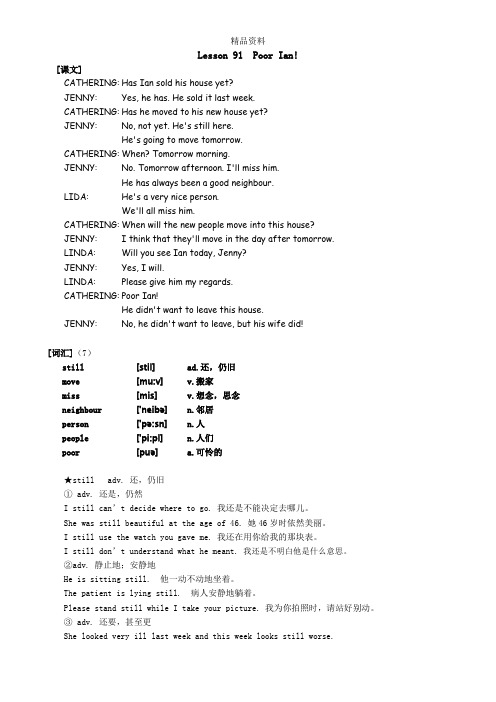
Lesson 91 Poor Ian![课文]CATHERING: Has Ian sold his house yet?JENNY: Yes, he has. He sold it last week.CATHERING: Has he moved to his new house yet?JENNY: No, not yet. He's still here.He's going to move tomorrow.CATHERING: When? Tomorrow morning.JENNY: No. Tomorrow afternoon. I'll miss him.He has always been a good neighbour.LIDA: He's a very nice person.We'll all miss him.CATHERING: When will the new people move into this house?JENNY: I think that they'll move in the day after tomorrow.LINDA: Will you see Ian today, Jenny?JENNY: Yes, I will.LINDA: Please give him my regards.CATHERING: Poor Ian!He didn't want to leave this house.JENNY: No, he didn't want to leave, but his wife didstill [stil]ad.还,仍旧move [mu:v]v.搬家miss [mis]v.想念,思念neighbour ['neibə] n.邻居person ['pə:sn] n.人people ['pi:pl] n.人们poor [puə] a.可怜的★still adv. 还,仍旧① adv. 还是,仍然I still can’t decide where to go. 我还是不能决定去哪儿。
新概念英语第一册第91课
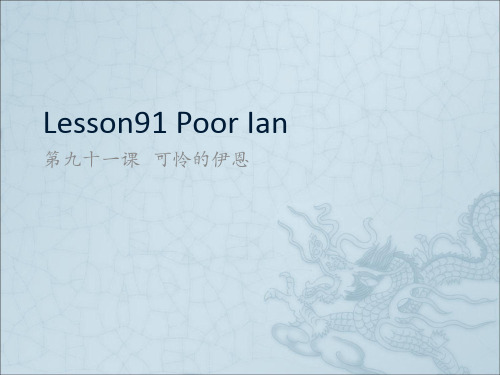
语法 演讲
口语表达 作文
目前尚可 由于时间关系未进行
由于时间关系未进行 不错,但注意一些细节的语法问题
其他需要注意 做题的时候要仔细,开口的时候要大胆。
Let’s learn more
Person 表示单个人 People 表示人们,是复数。 She’s the right person for this job. There’re a lot of people in the park. 我们家有三口人。 他是做老师的不错人选。
homework
1.翻译短文。听写91,35,36单词,错一个改 五遍。并背会课文。 2.自己安排读课文、预习课文和自学课文. 每天都要保证高质量地读两遍。 3.每天复述一遍课文。 4.奥特曼打小怪兽 5.准备演讲,题目自拟。准备Topic.
冯千禧五年级下第3次课堂表现
日期 作业 态度 听力 发音 语音语调 2011年2月26日 完成得很好 上课态度认真,只是在纠音的过程中觉得有点枯燥 需要仔细分辨资料中容易混淆的句子 希望每次发音的时候都能够将口型完全打开,声音放出来 常常有开头部分读得重,越到后来声音越轻的现象,希望尽快矫 正。
一般将来时
一般将来时表示将来某一时刻的动作或状 态,或将来某一段时间内经常的动作或状 态。常常和表示将来的时间状语连用。如: tomorrow(明天), next week(下周), from now on(从现在开始);in the future (将来)等。 一般将来时由助动词shall (第一人称),will(第二、三人称) 动词 原形构成。美国英语则不管什么人称,一 律用will。
来看这一组句子
新概念英语青少版第一册Lesson91:Beansorice-cream?要豆还是冰淇淋?
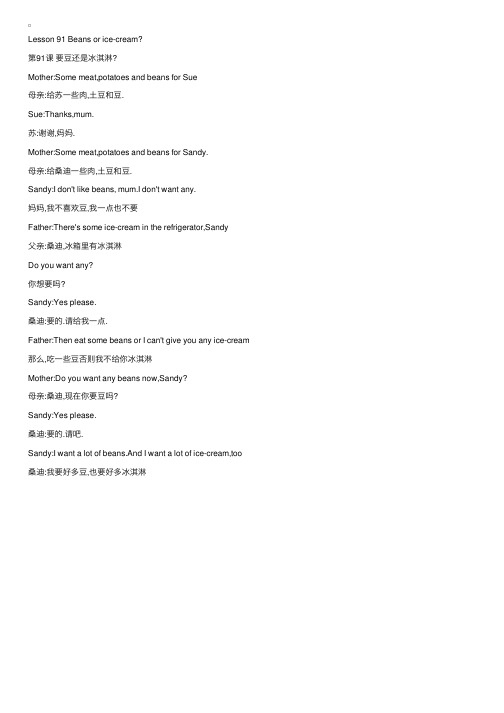
Lesson 91 Beans or ice-cream? 第91课 要豆还是冰淇淋? Mother:Some meat,potatoes and beans for Sue 母亲:给苏一些肉,土豆和豆. Sue:Thanks,mum. 苏:谢谢,妈妈. Mother:Some meat,potatoes and beans for Sandy. 母亲:给桑迪一些肉,土豆和豆. Sandy:I don't like beans, mum.I don't want any. 妈妈,我不喜欢豆,我一点也不要 Father:There's some ice-cream in the refrigerator,Sandy 父亲:桑迪,冰箱里有冰淇淋 Do you want any? 你想要吗? Sandy:Yes please. 桑迪:要的.请给我一点. Father:Then eat some beans or I can't give you any ice-cream 那么,吃一些豆否则我不给你冰淇淋 Mother:Do you want any beans now,Sandy? 母亲:桑迪,现在你要豆吗? Sandy:Yes please. 桑迪:要的.请吧. Sandy:I want a lot of beans.And I want a lot of ice-cream,too
新概念英语第一册91课最新版本
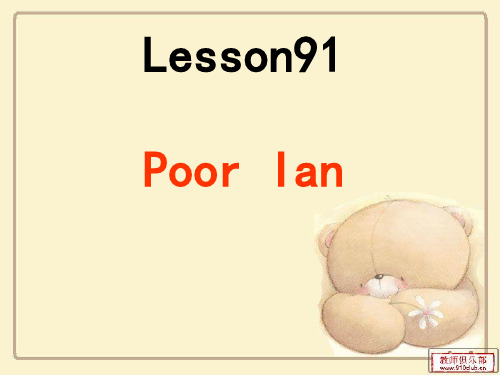
★move v. 搬家;感动 The story moves me. move to 搬到……地方 move in 搬进 move out 搬出来 move away 搬走 move into 搬进(由外到内的过程)
精品课件
★miss v. 想念,思念 ① v. 想念,惦念 ② v. 错过;未做到 He overslept and missed his train. 他睡过了头,错过了他那班火车。 I missed an opportunity of realizing my dream. 我错过了一个可能实现自己梦想的机会。
名词 表示民族时 可加s ten people 十个人 56 peoples 56个民族 the peoples of China and USA (指两国人民,用复数形式)
精品课件
一般将来时 (Will + 动词原形)
past
present(now) future
Lesson91 Poor Ian
精品课件
一 词汇
still adv. 还,仍旧 move v. 搬家 miss v. 想念,思念 neighbour n. 邻居 person n. 人 people n. 人们 poor adj. 可怜的
精品课件
★still adv. 还,仍旧 ① adv. 还是,仍然 I still don’t understand what he meant. ② adv. 还要,甚至更 She looked very ill last week and this week looks still worse. ③ adv. 静止地;安静地 He is sitting still. 他一动不动地坐 着。 The patient is ly精i品n课g件 still. 病人安静
新概念英语第一册lesson91-92分析
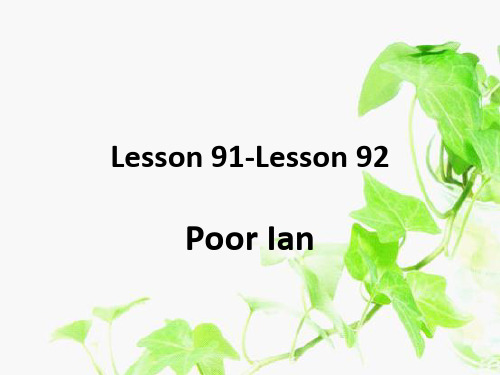
Poor Ian
• still • move • miss • neighbour • person • people • poor
adv. 还,仍旧 v. 搬家 v. 想念,思念 n. 邻居 n. 人 n. 人们 adj. 可怜的
• still adv. 还,仍旧 • ① adv. 还是,仍然 • 我仍然不知道他是什么意思。
• -No, not yet. • Move to 搬到… • 我明天要搬到B区的办公室。
• I'll move to the office in zone B tomorrow.
• Yet用于疑问句和否定句的句尾。
• No, he has not moved to his new house yet.
• We'll move to the country next month.
• miss • ① v. 想念,惦念 • 我想你 • I missed you.
• I'll miss him. = I will miss him • I miss home very much. • I miss you because I missed you.
shall,Will的用法
• 在表达将来要发生的事情时,通常要用到 shall和will, shall一般与第一人称连用,will 一般与第二和第三人称连用,但是现在已 经很少用到shall了,大家都被美语同化了, 不论人称都用will。
• I will go to school tomorrow. • My husband and I will both miss him. 当人数
• 公园里有很多人。
新概念英语单词第一册第91课:可怜的伊恩

新概念英语单词第一册第91课:可怜的伊恩Lesson91: Poor Ian第91课:可怜的伊恩still还,仍旧You know our company is a newly-built one.Things will go better with development.你知道我们公司刚成立不久,所有事情都会随着发展而好起来的。
Maybe.Thank you for your help,but I still want to leavethe company to seek development.也许吧。
谢谢您的关照,但我还是想离开公司另谋发展。
move搬家I really wouldn't want to move.我实在不愿意搬家。
But we have to do so this time.但这次我们必须这么做。
miss想念,思念I know how you miss your mother.我了解你多么地想念你的母亲。
Yes,I have left my hometown for a year.是的,我已经离开我的家乡一年了。
neighbor邻居How are you getting along with your neighbor?你和你的邻居相处得怎么样?We get along with each other very well.我们相处得非常好。
personYou're a very important person at this party.今晚的宴会你是贵宾Oh,please don't make fun of me.哦,别嘲笑我了。
people人们I think people in the country are happier than people in the city.我认为乡下的人们比城市的人们更快乐。
Can you tell me why?能告诉我为什么吗?poor可怜的Poor thing!He must be feeling awful now.可怜的人儿!他现在一定很不好受。
新概念英语lesson91
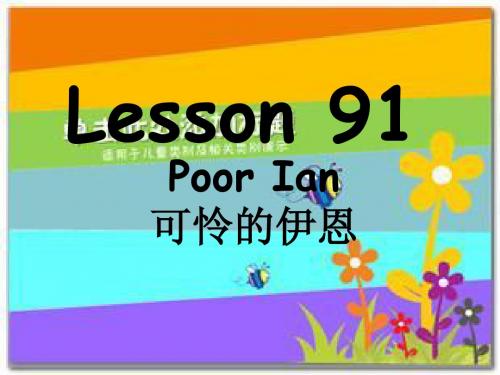
conversation!’
• • • •
Exercise B部分 It rained yesterday. Yes, and it will rain tomorrow, too.
v. 想念,思念 n. 邻居 adv. 还,仍旧 v. 搬家 n. 人 adj. 可怜的 n. 人们
Listen and answer the questions
• • • • 1.Who wanted to sell the house? Ian ’ s wife 2. When will Ian move? Tomorrow afternoon.
person
n. 人 n. ①人们 He is a nice/good person. There are a lot of people in the street. 他是个好人。 街上有很多人。 personal the people 民众,人民,国民 adj. 个人的,私人的 ②民族 a personal letter
CATHERINE:When will the new people move into this house? move into = move to 搬进。 JENNY:I think that they'll move in the day after tomorrow. LINDA:Will you see Ian today, Jenny? JENNY:Yes, I will. LINDA:Please give him my regards. give sb. sth. = give sth. to sb. 给某人某物=把某物 给某人 请代我们问候你的父母 Please give your parents our regards.
新概念课堂笔记 第一册 Lesson 91-92

新概念英语课堂笔记第一册 Lesson 91-92【讲解】people作“人们〞讲时为集体名词 ,本身即为复数。
作“人民〞讲时 ,也是集体名词 ,其前一般加the。
作“民族〞讲时是可数名词 ,有复数形式 ,也可与a连用。
people常用于指大批人或不精确说明人数的场合;而person一般用于指烧炼的人或精确说明人数的场合。
some people一些人;two persons两个人。
【例句】There are lot of people on the street. 那条街上人很多。
The government must depend on the people. 政府必须依靠人民。
There are 56 peoples in China. 中国有56个民族。
poor【用法】adj. 可怜的;贫穷的;差的【词组】the poor 穷人【例句】The wine was poor. 这葡萄酒很劣质。
I feel sorry for that poor child. 我为那个可怜的孩子感到难过。
My spoken English is poor. 我口语很差。
NamesCatherine /ˈkæθərin/ 奈杰尔〔男子名〕Jenney /ˈdʒeni/ 詹尼〔男子名〕Linda /'lɪndə/ 琳达【译文】他一直都是个好邻居。
【用法】○1本句是用现在完成时表达一般现在时的含义 ,如此处用一般现在时 ,那么语气就比拟平淡。
○2 neighbour是一个具体名词 ,用来表示邻居;而neighbourhood是一个抽象名词 ,用来表示邻里关系。
I think that they’ll move in the day after tomorrow.【译文】我想他们将在后天搬进来吧。
【用法】○1 I think 后面加了一个宾语从句 ,由that引导:that they’ll move in the day after tomorrow.○2 move in“搬进去〞 ,此处in为副词 ,因其后没有宾语。
新概念一册91到100课原文及译文
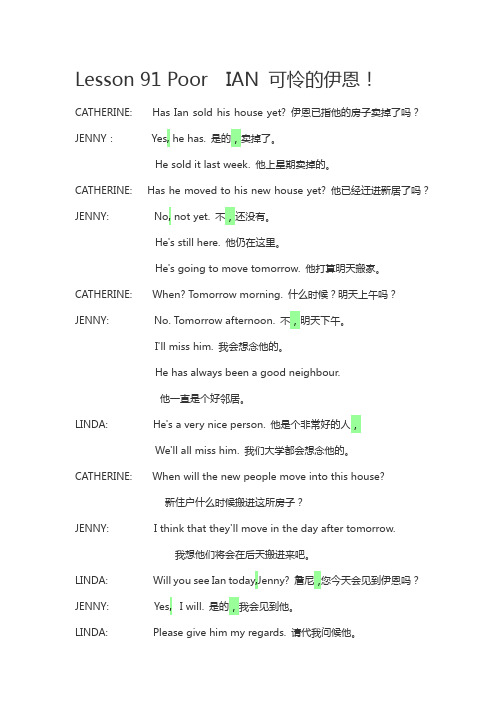
Lesson 91 Poor IAN 可怜的伊恩!CATHERINE: Has Ian sold his house yet? 伊恩已指他的房子卖掉了吗?JENNY:Yes, he has. 是的,卖掉了。
He sold it last week. 他上星期卖掉的。
CATHERINE: Has he moved to his new house yet? 他已经迁进新居了吗?JENNY: No, not yet. 不,还没有。
He's still here. 他仍在这里。
He's going to move tomorrow. 他打算明天搬家。
CATHERINE: When? Tomorrow morning. 什么时候?明天上午吗?JENNY: No. Tomorrow afternoon. 不,明天下午。
I'll miss him. 我会想念他的。
He has always been a good neighbour.他一直是个好邻居。
LINDA: He's a very nice person. 他是个非常好的人,We'll all miss him. 我们大学都会想念他的。
CATHERINE: When will the new people move into this house?新住户什么时候搬进这所房子?JENNY: I think that they'll move in the day after tomorrow.我想他们将会在后天搬进来吧。
LINDA: Will you see Ian today,Jenny? 詹尼,您今天会见到伊恩吗?JENNY: Yes,I will. 是的,我会见到他。
LINDA: Please give him my regards. 请代我问候他。
CATHERINE: Poor Ian! 可怜的伊恩!He didn't want to leave this house.他本不想离开这幢房子。
新概念第一册 Lesson 91-92
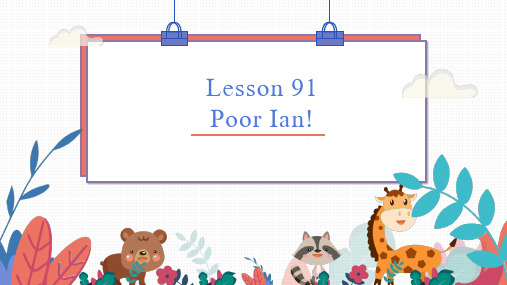
No, not yet. He’s _________ tomorrow.
CATHERINE: When? Tomorrow morning?
JENNY:
___. Tomorrow afternoon.
I’ll miss him. He __________ a good neighbor.
LINDA:
v. 邻居
poor /pɔː(r)/
adj. 可怜的
still
still /stɪl/
adv. 还,仍旧
E.g. Is he still working on his homework? 他还在写作业吗?
move
move /mu:v/
v. 移动,搬家
move to sp (some place) 搬到某处
LINDA:
______ you see Ian today, Jenny?
JENNY:
Yes, I will.
LINDA:
Please _____ him my regards.
CATHERINE: Poor Ian! He didn’t want to _____ this house.
JENNY:
No, he didn’t want to leave 是对上一句话的证实,要根据事实来决定用Yes
还是No, 翻译要以诚肯定的意思,“是的,他不想离开。”
参考译文
凯瑟琳:伊恩已把他的房子卖掉了吗?
詹
尼:是的,卖掉了。他上星期卖掉的。
凯瑟琳:他已经迁进新居了吗?
詹
尼:不,还没有。他仍在这里。他打算明天搬家。
CATHERINE: When? Tomorrow morning?
裕兴新概念英语笔记:Lesson 91 Poor Ian

Lesson 91 Poor Ian!still adv. 还,仍旧move v. 搬家miss v.想念neighbour n.邻居person n.人people n.人们poor adj. 可怜的still adv.1)还,仍旧eg. I still can't decide where to go.我还是不能决定去哪儿。
eg. She was still beautiful at the age of 46.她46岁时依然美丽。
eg. I still use the watch you gave me.我还在用你给我的那块表。
2) 静止地;安静地eg. He is sitting still. 他一动不动地坐着。
eg. The patient is lying still. 病人安静地躺着。
eg. Please stand still while I take your picture.我为你拍照时,请站好别动。
move1)v.搬家move from…to… 从…搬到…eg. They moved from Nanjing to Shenzhen.他们从南京搬到深圳。
eg. We are going to move to a house in the country.我们将要搬到乡下的房子。
2)移动eg. Don't move that chair, because I've just painted it.请不要搬动那张椅子,因为我刚刚漆过。
eg. The teacher asked her to move to the front of the classroom.老师请她坐到教室的前面去。
eg. Move along, please. 往前走。
3)使感动,使动心eg. Her song moved us greatly. 她的歌深深地打动了我们。
eg. His story moved us to tears. 他的故事感动得我们流泪。
新概念英语第一册L91~92
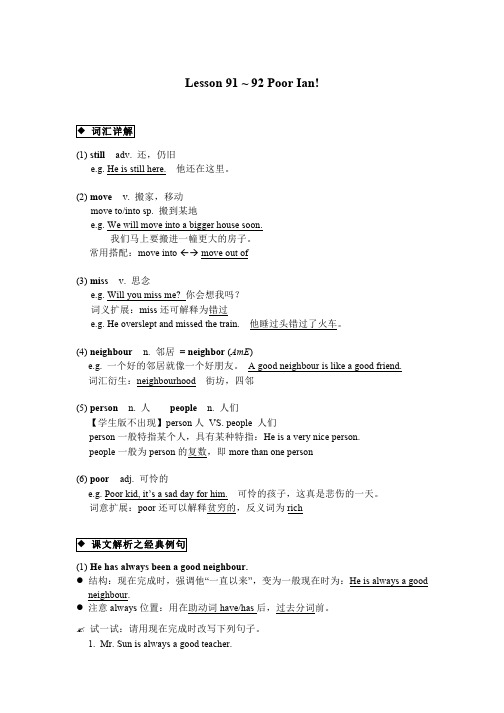
Lesson 91 ~ 92 Poor Ian!◆ 词汇详解(1) still adv. 还,仍旧e.g. He is still here. 他还在这里。
(2) move v. 搬家,移动move to/into sp. 搬到某地e.g. We will move into a bigger house soon.我们马上要搬进一幢更大的房子。
常用搭配:move into !" move out of(3) miss v. 思念e.g. Will you miss me? 你会想我吗?词义扩展:miss还可解释为错过e.g. He overslept and missed the train. 他睡过头错过了火车。
(4) neighbour n. 邻居= neighbor (AmE)e.g. 一个好的邻居就像一个好朋友。
A good neighbour is like a good friend.词汇衍生:neighbourhood 街坊,四邻(5) person n. 人people n. 人们【学生版不出现】person人VS. people 人们person一般特指某个人,具有某种特指:He is a very nice person.people一般为person的复数,即more than one person(6) poor adj. 可怜的e.g. Poor kid, it’s a sad day for him. 可怜的孩子,这真是悲伤的一天。
词意扩展:poor还可以解释贫穷的,反义词为rich◆ 课文解析之经典例句(1) He has always been a good neighbour.#结构:现在完成时,强调他“一直以来”,变为一般现在时为:He is always a good neighbour.#注意always位置:用在助动词have/has后,过去分词前。
- 1、下载文档前请自行甄别文档内容的完整性,平台不提供额外的编辑、内容补充、找答案等附加服务。
- 2、"仅部分预览"的文档,不可在线预览部分如存在完整性等问题,可反馈申请退款(可完整预览的文档不适用该条件!)。
- 3、如文档侵犯您的权益,请联系客服反馈,我们会尽快为您处理(人工客服工作时间:9:00-18:30)。
新概念英语第一册课文翻译及学习笔记Lesson91【课文】
CATHERING: Has Ian sold his house yet?
JENNY: Yes, he has. He sold it last week.
CATHERING: Has he moved to his new house yet?
JENNY: No, not yet. He's still here. He's going to move tomorrow.
CATHERING: When? Tomorrow morning?
JENNY: No. Tomorrow afternoon. I'll miss him. He has always been a good neighbour.
LIDA: He's a very nice person. We'll all miss him.
CATHERING: When will the new people move into this house?
JENNY: I think that they'll move in the day after tomorrow.
LINDA: Will you see Ian today, Jenny?
JENNY: Yes, I will.
LINDA: Please give him my regards.
CATHERING: Poor Ian! He didn't want to leave this house.
JENNY: No, he didn't want to leave, but his wife did!
【课文翻译】
凯瑟琳:伊恩已他的房子卖掉了吗?
詹尼:是的,卖掉了。
他上星期卖掉的。
凯瑟琳:他已经迁进新居了吗?
詹尼:不,还没有。
他仍在这里。
他打算明天搬家。
凯瑟琳:什么时候?明天上午吗?
詹尼:不,明天下午。
我会想念他的。
他一直是个好邻居。
琳达:他是个非常好的人,我们大家都会想念他的。
凯瑟琳:新住户什么时候搬进这所房子?
詹尼:我想他们将会在后天搬进来吧。
琳达:詹尼,您今天会见到伊恩吗?
詹尼:是的,我会见到他。
琳达:请代我问候他。
凯瑟琳:可怜的伊恩!他本不想离开这幢房子。
詹尼:是啊,他是不想离开,不过他妻子要离开。
【生词】
still adv. 还,仍旧
move v. 搬家
miss v. 想念,思念
neighbor n. 邻居
person n. 人
people n. 人们
poor adj. 可怜的
【知识点讲解】
1. 本课当中我们终于接触到了第一个从句:I think that
they'll move in the day after tomorrow.(我想他们后天搬进来。
)这是一个宾语从句,大家在这里只要有一个简单的印象就好,不用太
纠结。
这句话中I think that... 是主句,意思是我想……;they'll move in the day after tomorrow. 他们后天搬进来,这后半句是一
个完整的句子,就是从句了。
2. 课文最后两句对话:
CATHERING: Poor Ian! He didn't want to leave this house.
JENNY: No, he didn't want to leave, but his wife did!
请注意Jenny的回答"No, he didn't..."是对前面Cathering观点的肯定。
这里使用"No"开头,和我们中文的习惯不太一样。
大家能
够理解为Jenny在顺着Cathering的话说,但翻译成中文时就要改成
汉语习惯,译为:是啊,他不想离开。
3. Poor Ian,意思是可怜的伊恩。
英文中常用Poor XX来表达
同情。
如果朋友遭遇不幸,你能够说"You poor little thing." 你这可怜的小东西!——来安慰对方。
